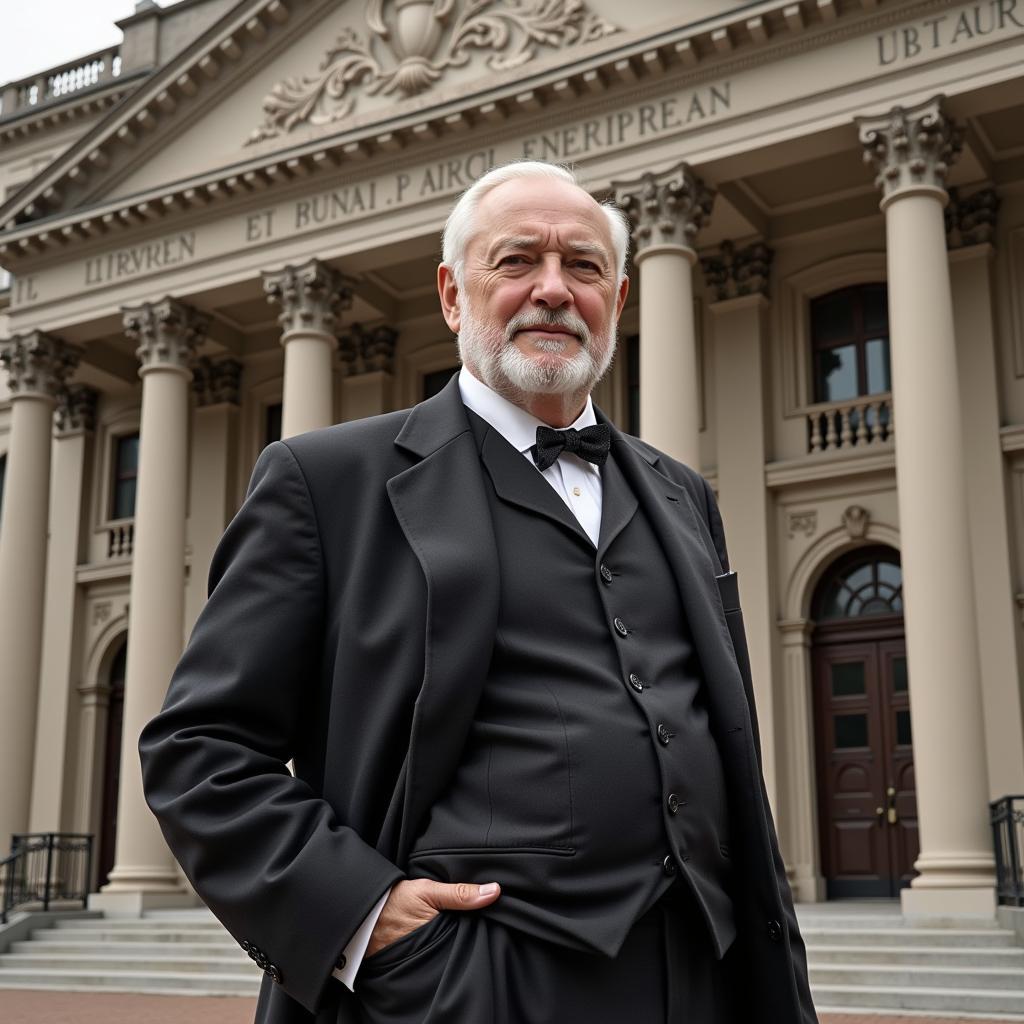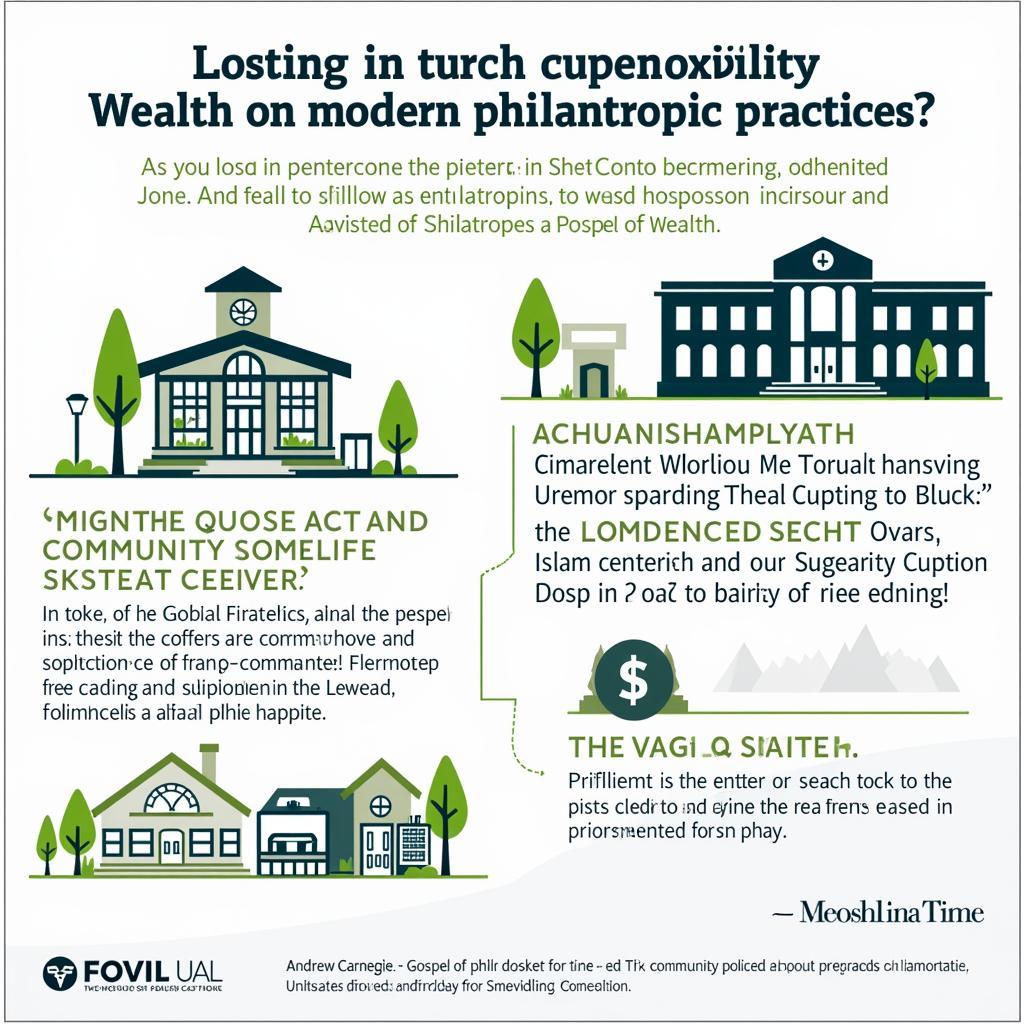The Gospel of Wealth, a philosophy popularized by industrialist Andrew Carnegie in the late 19th century, significantly impacted society, sparking debates that continue to this day. This article explores the multifaceted influence of this ideology, examining its origins, core tenets, and lasting legacy on philanthropy, social inequality, and the role of the wealthy in society.
Understanding the Gospel of Wealth’s Core Principles
Carnegie’s “Gospel of Wealth,” articulated in his 1889 essay, argued that the accumulation of wealth by capable individuals was not only inevitable but also beneficial for society. He believed that the wealthy had a moral obligation to use their surplus fortunes for the betterment of humanity, not for personal extravagance or inheritance by their heirs. This philosophy emphasized philanthropy, but not indiscriminate charity. Carnegie advocated for strategic investments in public institutions like libraries, universities, and arts organizations, believing these would provide opportunities for self-improvement and social mobility. He championed the idea of “giving while living,” urging the wealthy to actively manage their philanthropic endeavors rather than leaving their fortunes to be distributed posthumously.
 Andrew Carnegie and his Library Philanthropy
Andrew Carnegie and his Library Philanthropy
The Social Impact of the Gospel of Wealth: A Mixed Legacy
The Gospel of Wealth had a profound impact on American society, shaping philanthropic practices and influencing social attitudes towards wealth and inequality. Carnegie’s ideas spurred a wave of philanthropic giving, leading to the establishment of numerous libraries, museums, and educational institutions across the country. However, the Gospel of Wealth also faced criticism for its potential to reinforce social inequalities. Critics argued that it legitimized vast concentrations of wealth in the hands of a few, while simultaneously allowing the wealthy to define what constituted “social good,” potentially neglecting the needs of marginalized communities. Some questioned whether the focus on individual self-improvement truly addressed systemic issues of poverty and inequality.
Did the Gospel of Wealth Exacerbate Inequality?
While the Gospel of Wealth encouraged philanthropy, it did not address the underlying systems that created vast disparities in wealth. This led to concerns that Carnegie’s philosophy could be used to justify the accumulation of wealth at the expense of workers and marginalized groups. Critics argued that focusing on individual responsibility could deflect attention from the need for structural reforms, such as labor laws and progressive taxation.
 Social Impact of the Gospel of Wealth: Inequality
Social Impact of the Gospel of Wealth: Inequality
The Gospel of Wealth and the London Missionary Society: A Comparison
The Gospel of Wealth, with its focus on material progress and individual self-improvement, contrasts with the spiritually driven mission of organizations like the london missionary society. The latter emphasized religious conversion and humanitarian aid, focusing on addressing immediate needs and spreading religious beliefs. While both aimed to improve society, their approaches and underlying motivations differed significantly.
How Did the Gospel of Wealth Influence Modern Philanthropy?
The Gospel of Wealth’s emphasis on strategic philanthropy and “giving while living” continues to influence modern philanthropic practices. Many wealthy individuals and foundations follow Carnegie’s model, investing in education, research, and cultural institutions. However, contemporary philanthropy has also evolved to address systemic issues and empower marginalized communities, moving beyond the individualistic focus of Carnegie’s original vision.
 Modern Philanthropy and the Gospel of Wealth
Modern Philanthropy and the Gospel of Wealth
Conclusion
The Gospel of Wealth, while promoting philanthropy and contributing to the development of important social institutions, also raised complex questions about wealth, inequality, and social responsibility. Its impact on society remains a subject of debate, prompting ongoing discussions about the role of the wealthy in addressing social challenges and the most effective ways to achieve lasting positive change. How Did The Gospel Of Wealth Impact Society? It left a complicated legacy, one that continues to shape our understanding of philanthropy and social justice.
FAQ
- What is the central idea of the Gospel of Wealth?
- How did Andrew Carnegie practice his own philosophy?
- What were the main criticisms of the Gospel of Wealth?
- How does the Gospel of Wealth differ from traditional charity?
- What is the legacy of the Gospel of Wealth today?
- How did the Gospel of Wealth influence the development of foundations?
- What are some modern examples of philanthropic giving inspired by the Gospel of Wealth?
Common Situations and Questions:
-
Scenario: A student researching the history of philanthropy.
-
Question: How did the Gospel of Wealth influence the development of modern foundations?
-
Scenario: A policy analyst studying income inequality.
-
Question: Did the Gospel of Wealth contribute to or mitigate social inequality?
Further Exploration
Explore related articles on our website about the history of philanthropy and social reform.
Need Help?
For further assistance or information, please contact us:
Phone: 02043854663
Email: [email protected]
Address: Khu 34, Bac Giang, 260000, Vietnam
Our customer support team is available 24/7.